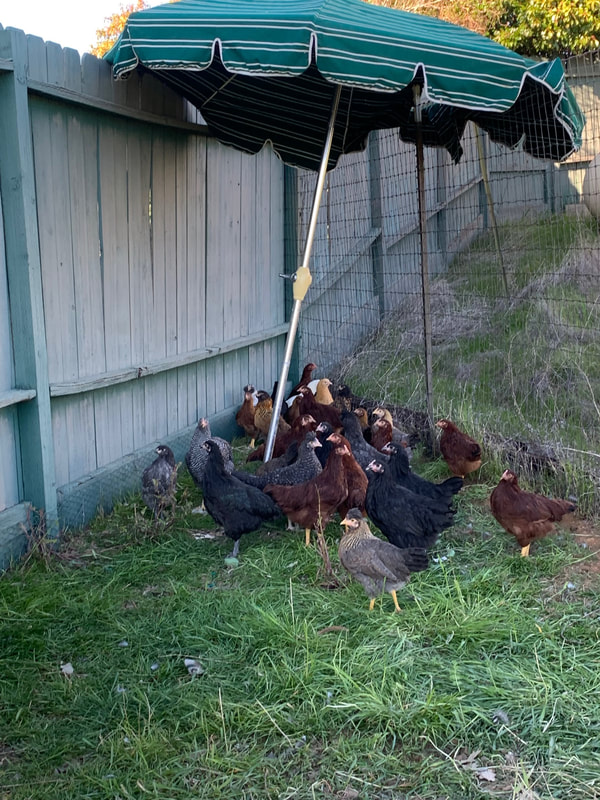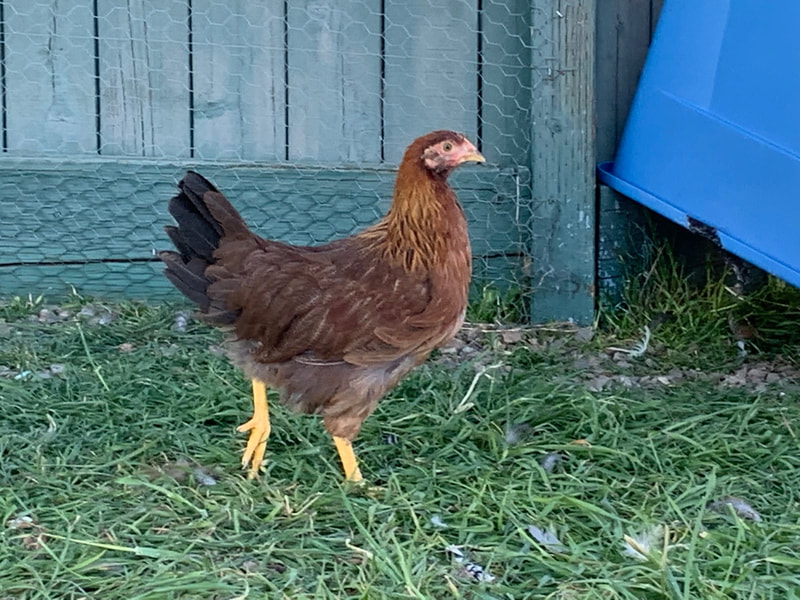Free Range Eggs from Pastured Chickens for Thriving Families
Healthy Soil = Nutrient Rich Plants = Healthy Animals = Thriving Families
Beautiful, Nutritious, Free-Range “Easter Eggs”

Enjoy the most delicious, healthy eggs from our pastured chickens. Out on pasture every day, our chickens have plenty of room to free-range and dig up grubs. They keep our fields and our orchard pest free!
We call our eggs “Easter Eggs” because, like our chickens, they come in a variety of colors and sizes. They are beautiful. We don’t wash our eggs. Instead, we use rollaway nest boxes to keep them clean naturally. Washing our eggs would remove bloom (natural coating) on the eggs. We don’t want remove the bloom because it is essential to naturally maintaining the freshness and integrity of the egg.
Did you know that eggs can be stored at room temperature? Well they can and in places like Europe, this is the normal practice. However, in the US, commercial eggs must be refrigerated since they are rigorously washed which removes the bloom and potentially injects contaminants into the egg thru the porous egg shell.
We prefer to treat our eggs naturally, keeping the bloom intact and storing them at room temperature until they are sold. Once you receive them, you can keep them at room temperature or in your refrigerator as you like. Just don’t leave them out at room temperature after storing them in your refrigerator since the cold has altered the natural defenses of the egg and therefore it needs to stay refrigerated.
We call our eggs “Easter Eggs” because, like our chickens, they come in a variety of colors and sizes. They are beautiful. We don’t wash our eggs. Instead, we use rollaway nest boxes to keep them clean naturally. Washing our eggs would remove bloom (natural coating) on the eggs. We don’t want remove the bloom because it is essential to naturally maintaining the freshness and integrity of the egg.
Did you know that eggs can be stored at room temperature? Well they can and in places like Europe, this is the normal practice. However, in the US, commercial eggs must be refrigerated since they are rigorously washed which removes the bloom and potentially injects contaminants into the egg thru the porous egg shell.
We prefer to treat our eggs naturally, keeping the bloom intact and storing them at room temperature until they are sold. Once you receive them, you can keep them at room temperature or in your refrigerator as you like. Just don’t leave them out at room temperature after storing them in your refrigerator since the cold has altered the natural defenses of the egg and therefore it needs to stay refrigerated.
You Can't Beat Freshly Laid Eggs
You will be receiving your eggs within a couple days of when our hens have laid them. This is much more quickly than you can ever obtain commercial eggs. Commercial eggs typically don’t hit the stores until at least two weeks after they have been laid. It is a good think that eggs can be safely stored in your refrigerator for 50 days. We don’t like the idea of old, refrigerated eggs.
Due to the free range nature as well as the freshness and lack of washing of OUR eggs, many more vitamins, minerals, enzymes and nutrients will be available to you.
Due to the free range nature as well as the freshness and lack of washing of OUR eggs, many more vitamins, minerals, enzymes and nutrients will be available to you.
Eggs at Room Temperature

Yes, we don’t refrigerator our eggs before selling them. Why can eggs be stored safely at room temperature? Well, because they are meant to be stored at room temperature and remain viable for several weeks. This is because of how chickens reproduce.
A chicken will lay one egg every other day until she has between 6 – 10 eggs. Then she will push them together and sit on them, incubating them and starting the process where the fertilized eggs turns into a chicks. If you do the math, you will realize that eggs need to stay perfectly healthy, preserved and reproductively viable for at least 20 days at room temperature.
A chicken will lay one egg every other day until she has between 6 – 10 eggs. Then she will push them together and sit on them, incubating them and starting the process where the fertilized eggs turns into a chicks. If you do the math, you will realize that eggs need to stay perfectly healthy, preserved and reproductively viable for at least 20 days at room temperature.
Nutrient Density Tests Show Free Range Eggs from Pastured Chickens Contain the Following
(as compared to a standard USDA egg)
- 21 times MORE omega-3 fatty acids
- 7 times MORE Vitamin E
- 1-1/2 times MORE Vitamin A
- 7-1/2 times MORE Beta Carotene
- 217 times MORE Folate
- 30% LESS Cholestrol
- 25 times LESS Saturated Fat
Our Chickens Eat Only the Best

In addition to all the bugs, grubs, grasses, and worms they can find, our chickens are fed corn-free and soy-free Kaniksu feed.
Named after the local mountain range in northern Idaho, Kaniksu feed is the freshest, highest quality feed we could find. Yes, we like it better than Bar Ale and Modesto Mills. Although it is not labeled as organic (certification is expensive and time consuming), the folks at Kaniksu Feeds follow all organic practices and the feed is certified to tested free of Glyphosate and other herbicides. What we notice is that the feed is noticeably fresher and sweeter smelling than the other brands available locally.
Learn more about Kaniksu Feed
Named after the local mountain range in northern Idaho, Kaniksu feed is the freshest, highest quality feed we could find. Yes, we like it better than Bar Ale and Modesto Mills. Although it is not labeled as organic (certification is expensive and time consuming), the folks at Kaniksu Feeds follow all organic practices and the feed is certified to tested free of Glyphosate and other herbicides. What we notice is that the feed is noticeably fresher and sweeter smelling than the other brands available locally.
Learn more about Kaniksu Feed
Why You Should Avoid Eating Eggs From Chickens That Have Been Fed Corn and Soy
Soy and corn are a frequent additions, even in rations provided by organic farmers, but actually should be avoided. Given that corn and soy are two of the most widely produced GMO crops, we feel that getting truly GMO-free corn or soy is almost impossible.
What’s wrong with soy, you ask? To summarize, soy contains phytoestrogens or plant hormones (i.e., isoflavones) that have been found to disrupt endocrine function, negatively affect immunity, contribute to thyroid problems and cause hormonal changes in children (see more details and research references at www.westonaprice.org and in The Whole Soy Story by Kaayla Daniel, PhD, CCN). Research clearly demonstrates that soy isoflavones are transferred into the yolk of chickens fed a diet containing a high concentration of soy isoflavones.15 This simply means you’ll add eggs from soy-fed chickens to your list of phytoestrogenic foods to avoid.
What’s wrong with corn, you ask? Corn is not a nutrient dense food. Mostly starch, Corn feed provides more than enough calories, which causes chickens to bulk up quickly, but it's too low in fatty acids and certain amino acids, vitamins and minerals for chickens to thrive.
This is why we feed corn-free, soy-free food to our egg layers.
What’s wrong with soy, you ask? To summarize, soy contains phytoestrogens or plant hormones (i.e., isoflavones) that have been found to disrupt endocrine function, negatively affect immunity, contribute to thyroid problems and cause hormonal changes in children (see more details and research references at www.westonaprice.org and in The Whole Soy Story by Kaayla Daniel, PhD, CCN). Research clearly demonstrates that soy isoflavones are transferred into the yolk of chickens fed a diet containing a high concentration of soy isoflavones.15 This simply means you’ll add eggs from soy-fed chickens to your list of phytoestrogenic foods to avoid.
What’s wrong with corn, you ask? Corn is not a nutrient dense food. Mostly starch, Corn feed provides more than enough calories, which causes chickens to bulk up quickly, but it's too low in fatty acids and certain amino acids, vitamins and minerals for chickens to thrive.
This is why we feed corn-free, soy-free food to our egg layers.
More Information about Free-Range Eggs from Pastured Chickens
We are total egg nerds, but you may not be, so we will stop here. If you are interested in learning more, here are some great articles that you can read to learn more about eggs should you be interested:
- Learn all about the amazing nutrition available to you in free range eggs
- Egg Nutrition and Health Benefits Explain Why It’s a Superior Food
- Free range eggs are more nutritious and have half the cholesterol of supermarket eggs
- Free range eggs have more vitamin A, vitamin E, beta carotene and polyunsaturated opega-3 fatty acids than conventional eggs
- Soy-Ling of America: Second Hand Soy from Animal Feeds
- Chickens are Omnivores: It’s No Dilemma
- Free-Range Chicken Benefits vs. Conventional Chicken Dangers






